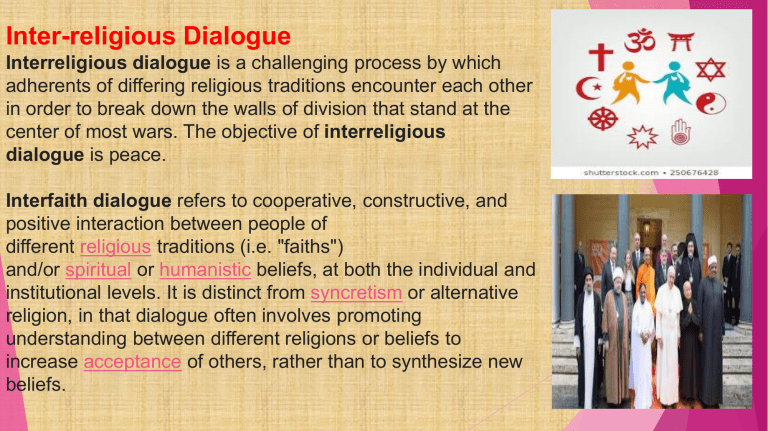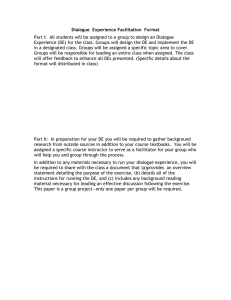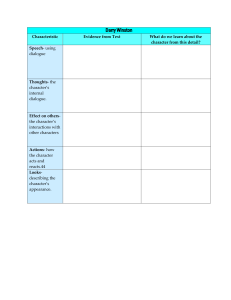
Inter-religious Dialogue Interreligious dialogue is a challenging process by which adherents of differing religious traditions encounter each other in order to break down the walls of division that stand at the center of most wars. The objective of interreligious dialogue is peace. Interfaith dialogue refers to cooperative, constructive, and positive interaction between people of different religious traditions (i.e. "faiths") and/or spiritual or humanistic beliefs, at both the individual and institutional levels. It is distinct from syncretism or alternative religion, in that dialogue often involves promoting understanding between different religions or beliefs to increase acceptance of others, rather than to synthesize new beliefs. Principles of Interfaith Dialogue https://www.scarboromissions.ca/interfaith-dialogue/principles-and-guidelines-forinterfaith-dialogue/8 FIRST PRINCIPLE The primary purpose of dialogue is to learn; that is, to change and grow in the perception and understanding of reality, and then to act accordingly. SECOND PRINCIPLE Inter-religious, inter-ideological dialogue must be a two-sided project within each religious or ideological community and between religious or ideological communities. THIRD PRINCIPLE Each participant must come to the dialogue with complete honesty and sincerity. FOURTH PRINCIPLE In inter-religious, inter-ideological dialogue we must not compare our ideals with our partner’s practice, but rather our ideals with our partner’s ideals, our practice with our partner’s practice. FIFTH PRINCIPLE Each participant must define himself… Conversely, the interpreted must be able to recognize herself in the interpretation. SIXTH PRINCIPLE Each participant must come to the dialogue with no hard-and-fast assumptions as to where the points of disagreement are. SEVENTH PRINCIPLE Dialogue can take place only between equals… Both must come to learn from each other. EIGHTH PRINCIPLE Dialogue can take place only on the basis of mutual trust. NINTH PRINCIPLE Persons entering into inter-religious, inter-ideological dialogue must be at least minimally self-critical of both themselves and their own religious or ideological traditions. TENTH PRINCIPLE Each participant eventually must attempt to experience the partner’s religion or ideology ‘from within’; for a religion or ideology is not merely something of the head, but also of the spirit, heart, and ‘whole being,’ individual and communal. Three Goals of Interreligious Dialogue 1. To know oneself ever more profoundly and enrich and round out one’s appreciation of one’s own faith tradition 2. To know the other ever more authentically and gain a friendly understanding of others as they are and not in caricature 3. To live ever more fully accordingly and to establish a more solid foundation for community of life and action among persons of various traditions Principles towards Better Interfaith Relations 1. We confess our failures and lack of love, respect and sensitivity to people of other faiths in the past. We intend to forgive one another, seek the forgiveness of others and commit ourselves to a new beginning. 2. We affirm that good interfaith relations can open the way to better interethnic relations and peace throughout the world. 3. We recognise building true community (koinonia) , both among persons and various ethnic and religious communities, as our primary objective. We need to develop a global theology that will be appropriate for the unfolding sense of a globalised world. 4. We affirm the importance of promoting a culture of dialogue within and among all religious communities and indigenous traditions. 5. We condemn violence and terrorism as being against the spirit of all true religion and we pledge ourselves to 6. We shall respect the integrity of all religions and ensure that they have the freedom to follow their own beliefs and practices. 7. We believe that the different religions are enriched by identifying agendas in which they can collaborate, such as making peace, protecting the environment, eradicating poverty and ensuring the human dignity of all. 8. We affirm that it is important for us all to listen to and learn from other religions so that we can value religious plurality as a factor that enriches our communities. 9. We endeavour to live out and explain the truths of our own religion in a manner that is intelligible and friendly to people of other faiths. 10. Cultural diversity as well as religious diversity in our communities will be affirmed as a source of enrichment and Four Levels of Interreligious Dialogue 1. The dialogue of life, where people strive to live in an open and neighborly spirit, sharing their joy and sorrows, their human problems and preoccupations. 2. The dialogue of action, in which persons of all religions collaborate for the integral development and liberation of people. 3. The dialogue of theological exchange, where specialists seek to deepen their understanding of their respective religious heritages, and to appreciate each other’s spiritual values. 4. The dialogue of religious experience, where persons, rooted in their own religious traditions, share their spiritual riches, for instance with regard to prayer and contemplation, Five Types of Interreligious Dialogue Informational: Acquiring of knowledge of the faith partner’s religious history, founding, basic beliefs, scriptures, etc. Confessional: Allowing the faith partners to speak for and define themselves in terms of what it means to live as an adherent. Experiential: Dialogue with faith partners from within the partner’s tradition, worship and ritual – entering into the feelings of one’s partner and permitting that person’s symbols and stories to guide. Relational: Develop friendships with individual persons beyond the “business” of dialogue. Practical: Collaborate to promote peace and justice. The Seven Stages of Deep-Dialogue Stage One Radical Encountering of Difference Early encounters with those of other religions are inherently challenging and even threatening as I face a new interpreting reality, and new ways of responding that are clearly other. I am tempted to appropriate the other that this disruption to my worldview and ways of responding won’t go away, nor will it accommodate my own may be tempted to withdraw from the situation, only to discover that my place in society may not allow for proceed moves me on into the second stage. Stage Two Crossing Over — Letting Go and Entering the World of the Other As I make the decision to engage the world of the other sincerely, I find myself called to explore, to learn regarding adequate and appropriate expressions of values, and to critique my traditional attitudes. I find that worldview with openness and a bracketing of my stereotypes and prejudices. As I do this, I find myself moving Stage Three Inhabiting and Experiencing the World of the Other The experience of empathy and interest then expands into a sense of freedom that opens doors to learn is of greatest importance, modalities of interaction, what causes suffering to those in this world. As I and acting in light of my discoveries, I sense an excitement and a deepening relationship with those of this gained some competence in negotiating this environment, I discover that this is not my true home. This Stage Four Crossing Back with an Expanded Vision The new knowledge I have gained in alternative ways of thinking and acting is now part of my repertoire as I regain my sense to think and act from both perspectives as the context may require. My own sense of identity has deepened, has changed, believe and to act, I can no longer assume that my former unilateral way of being in the world is the only way. My attitudes hold the other in view, in relationship. This moves me into stage five. Stage Five The Dialogic Awakening — A Radical Paradigm Shift I experience a profound shift in my worldview as well as expanded consciousness of concerns and needs and causes of of human response. I can no longer return to my former worldview that did not have a place for this other. Further, I am there is a plurality of viable worldviews, concerns, and human responses. This changes my sense of myself. I become aware many/all others, including Earth and all her needs and potentials. This awakening is what moves me into the sixth stage. Stage Six Global Awakening — The Paradigm Shift Matures This stage of Deep-Dialogue opens me to the common ground that underlies the multiple worlds with which I am surrounded. essential to these worlds are contained in a field of unity. My own inner world is now apparent as a range of perspectives and to dialogue with others in my various communities of life, to a transformed relationship with them and an embrace of the situated. There is for me an expanding world of communities of life with greater potential for ongoing dialogue, new learning, me to stage seven. Stage Seven Personal and Global Transforming of Life and Behaviour One of the most significant transformations that has taken place on this journey is a greater and more encompassing moral communion that I experience with all — self, others, and the Earth — is profound. I sense that my care for myself, instead of the welfare of other realities, is integral to the care of the whole. As I come to deeper self-realization and greater selfrelationships and in my whole life.



